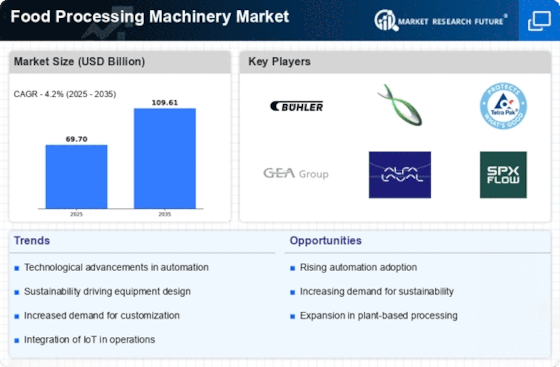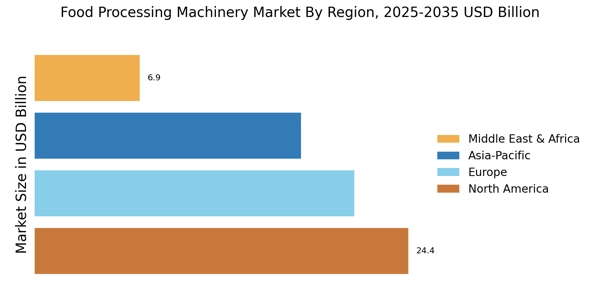Focus on Food Safety and Quality
The emphasis on food safety and quality is increasingly influencing the Food Processing Machinery Market. Regulatory bodies are imposing stringent standards to ensure that food products are safe for consumption. This has led to a surge in demand for machinery that can meet these rigorous safety requirements. Manufacturers are now prioritizing the development of equipment that incorporates advanced safety features and quality control mechanisms. As a result, the market is witnessing a shift towards machinery that not only processes food but also ensures its safety and quality, thereby driving growth in the Food Processing Machinery Market.
Rising Demand for Processed Foods
The increasing demand for processed foods is a primary driver of the Food Processing Machinery Market. As consumer lifestyles evolve, there is a noticeable shift towards convenience foods, which require advanced processing techniques. According to recent data, the processed food sector is projected to grow at a compound annual growth rate of approximately 6.5% over the next five years. This growth necessitates the adoption of sophisticated machinery to enhance production efficiency and maintain quality. Consequently, manufacturers are investing in innovative food processing blades technologies to meet this rising demand, thereby propelling the Food Processing Machinery Market forward.
Expansion of Food and Beverage Industry
The expansion of the food and beverage industry is a significant driver of the Food Processing Machinery Market. With the rise of new food trends and the increasing number of food establishments, there is a heightened need for efficient processing equipment. The food and beverage sector is expected to grow at a rate of approximately 5% annually, creating a robust demand for advanced food processing machinery. This growth is prompting manufacturers to innovate and diversify their product offerings to cater to the evolving needs of the industry, thus fostering further development within the Food Processing Machinery Market.
Technological Advancements in Machinery
Technological advancements play a crucial role in shaping the Food Processing Machinery Market. Innovations such as automation, artificial intelligence, and IoT integration are transforming traditional food processing methods. These technologies not only improve efficiency but also enhance product quality and safety. For instance, the implementation of smart sensors in machinery allows for real-time monitoring of production processes, reducing waste and ensuring compliance with safety standards. As a result, the market for food processing machinery is expected to expand significantly, with a projected growth rate of around 7% annually over the next few years, driven by these technological enhancements.
Sustainability and Eco-Friendly Practices
Sustainability initiatives are becoming increasingly important in the Food Processing Machinery Market. As consumers become more environmentally conscious, there is a growing demand for machinery that minimizes waste and energy consumption. Manufacturers are responding by developing eco-friendly processing solutions that align with sustainable practices. This shift not only helps in reducing the carbon footprint but also appeals to a broader customer base. The market for sustainable food processing machinery is projected to grow significantly, as companies seek to enhance their sustainability profiles while maintaining efficiency in production, thereby driving the Food Processing Machinery Market.

















